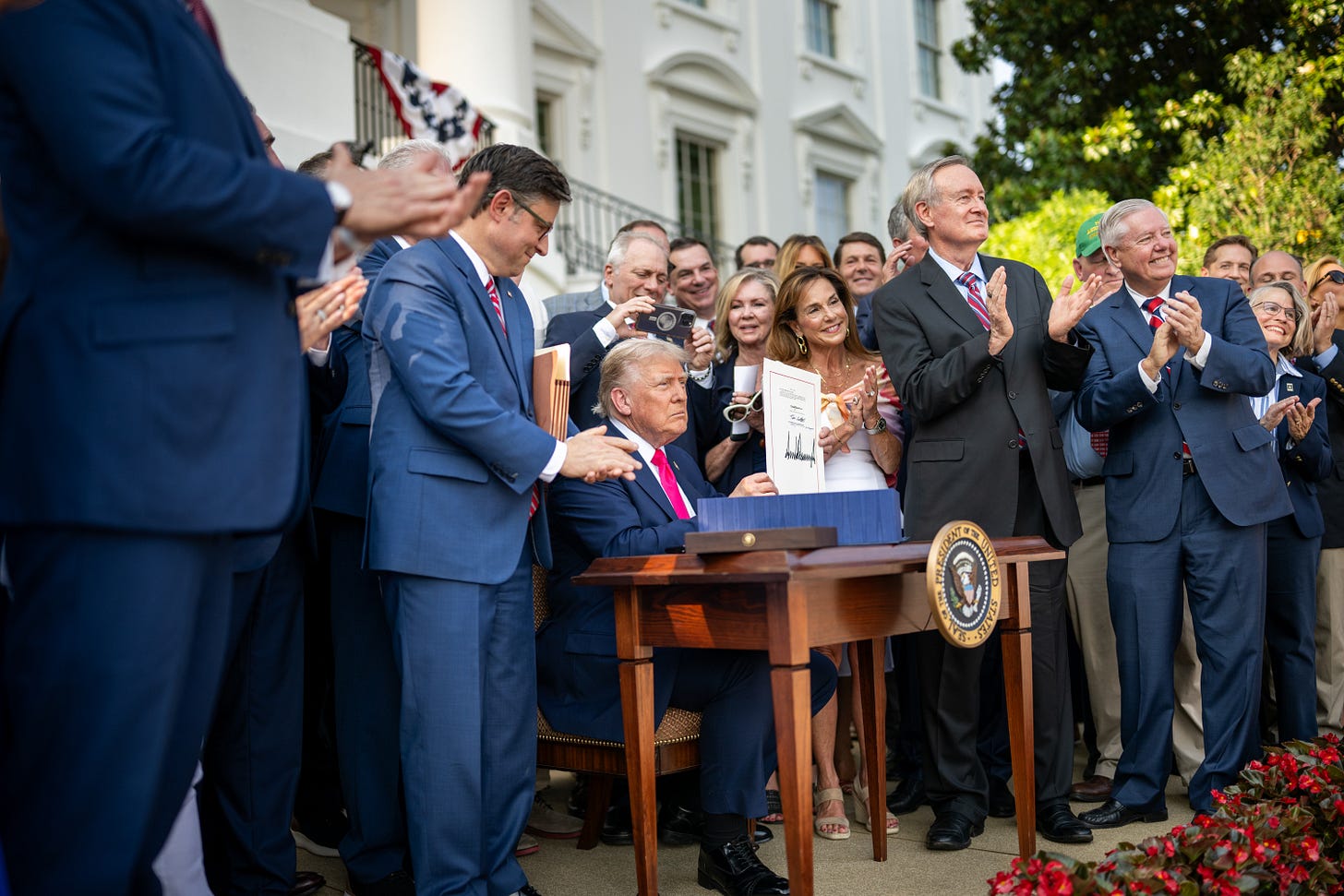Trump Passed His Megabill. Here's What It Means for You.
From tax relief to Medicaid cuts, here are 6 ways the sweeping package reshapes America’s economy and political map.

President Trump capped off his Independence Day celebration by signing his “One Big Beautiful Bill” into law - a sweeping 940-page package that narrowly cleared the House late Thursday night after a final push from the White House.
The bill includes permanent tax cuts for individuals and corporations, expanded military and border funding, and delayed but substantial reductions to Medicaid and food assistance. (BBC)
1. Last-Minute Push Paid Off
Trump leaned heavily on personal calls, dealmaking, and public pressure to overcome resistance from House conservatives. “We’ve got pretty good assurances out of the White House,” said Rep. Chip Roy (R-TX), who ultimately supported the bill after denouncing it just hours earlier.
The final House vote took place as Trump blasted holdouts on Truth Social and floated executive actions to address GOP concerns about spending and renewable energy. (WSJ)
2. Republicans Say the Bill Delivers for Working Families
In a memo from the National Republican Congressional Committee, Republicans pledged to make Democrats pay a political price for opposing popular provisions like tax cuts, border funding, and work requirements for Medicaid and SNAP. “Every Democrat voted to hurt working families and to protect the status quo,” the memo reads.
Rep. Tim Burchett (R-TN) argued the bill rewards fairness: “If you’re able to work, you ought to work.” Others acknowledged trade-offs but stood by the deal. “No bill is perfect,” said Rep. Chuck Edwards (R-NC), “but I believe that we’ve made some steps in the right direction.”
Pro-Trump groups have already begun ad campaigns highlighting GOP support for tax cuts and attacking Democrats in swing districts for opposing the bill. (CNN)
3. Democrats Warn of Healthcare Impact
Democrats unanimously opposed the bill, with House Minority Leader Hakeem Jeffries holding the floor for nearly nine hours in protest. He condemned the package as an “extraordinary assault on the healthcare of the American people,” highlighting testimony from individuals concerned about its impact. (BBC)
Meanwhile, Rep. Jared Gordon (D-ME) said, “I would never vote for these Medicaid cuts. Never.” (CNN)
Inside the Megabill: Winners, Losers, and a Musk Rebellion
🔑 Here’s an exclusive sneak peak into what our Pro Subscribers receive each weekday. We explore how the bill could reshape everyday American finances, Elon Musk’s plan to launch a new political party, and how Democrats are already reframing the law ahead of the 2026 midterms.
4. Breaking Down the Bill’s Economic Impact
The bill makes Trump’s 2017 tax cuts permanent and introduces new breaks for seniors, tipped workers, and overtime pay.
Supporters say these provisions will ease the burden on working families and boost take-home pay. Critics, however, point out that some benefits are delayed while cuts to Medicaid and food assistance take effect more quickly, harming low income families and individuals.
The bill also includes corporate tax changes and a softened inheritance tax, which analysts say could deliver the biggest gains to wealthier households, though experts remain divided on whether the overall impact will be widely shared. (USA Today)
5. Elon Musk’s Political Gambit
Tesla CEO Elon Musk announced he’s launching the “America Party” after a bitter fallout with Trump over the megabill’s passage.
Musk, who spent $300 million backing Trump in 2024, accused Republicans of selling out on spending and threatened to primary any lawmaker who voted yes. Trump responded by threatening to sic his “Department of Government Efficiency” on Musk’s government contracts and accused the billionaire of going “off the rails.”
Asked about Musk’s new political party, Trump said: “He can have fun with it, but I think it’s ridiculous,” while Treasury Secretary Scott Bessent said Tesla’s board would likely pressure Musk to refocus on his companies. (WSJ)
6. Democrats Look to 2026
Democrats wasted no time turning the bill into a campaign wedge. In a new ad blitz, party leaders are highlighting its Medicaid cuts and tax breaks for the ultra-wealthy, framing the law as Trump’s betrayal of his populist roots.
Rep. Brendan Boyle (D-PA) told CNN, “We will look back on election night last November, on what just happened this week, culminating with this vote today, as the beginning of the House majority for Democrats.”
Party leaders are focusing particularly on swing districts like that of Rep. David Valadao (R-CA), where nearly two-thirds of residents rely on Medicaid. “This is really a bad vote for David,” said Rep. Ami Bera (D-CA), who added that the most effective messengers are members of Congress speaking directly about the law’s local impacts.
House and Senate campaign arms have already reserved airtime and are rolling out state-specific messaging aimed at linking the bill to rising healthcare costs and reduced benefits. (CNN)
Is Trump’s megabill a turning point for the U.S. economy, or a political gamble that could backfire? Let us know what you think in the comments!



